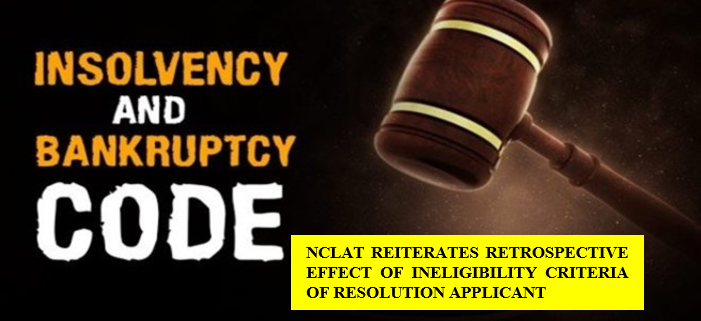NCLAT REITERATES RETROSPECTIVE EFFECT OF INELIGIBILITY CRITERIA OF RESOLUTION APPLICANT
The Hon’ble National Company Law Appellate Tribunal (‘#NCLAT’) in the case of Martin S.K. Golla vs. Wig Associates Pvt. Ltd. [CA (AT) (Ins.) No. 121/2019], vide its Judgment dated 04-06-2021 held that #ineligibility to submit #resolutionplan under #Section29A of the Insolvency and Bankruptcy Code, 2016 (‘#IBC’) attaches at the time when the resolution plan is submitted by #resolutionapplicant.
In this case, an Application was filed under Section 10 of IBC for initiating Corporate Insolvency Resolution Proceedings (‘CIRP’), by Wig Associates Pvt. Ltd. (‘Corporate Debtor’) against itself before the National Company Law Tribunal, Mumbai Bench, Mumbai (‘NCLT’) on 19-07-2017.
The NCLT vide its Order dated 24-08-2017 admitted the said Insolvency Application and appointed one Mr. Martin S.K. Golla as a Resolution Professional for the Corporate Debtor. The CIRP process had started against the Corporate Debtor, wherein one Mr. Mahendra Wig submitted his Resolution Plan, which was approved by the Committee of Creditors (‘COC’) on 20-04-2018. Thereafter, Section 29A of the IBC came into force on 06-06-2018 with retrospective effect from 23-11-2017, i.e. the date when the Ordinance dated 23-11-2017 was promulgated. Moreover, the approved Resolution Plan was placed before the NCLT by the Resolution Professional under Section 31 of the IBC for NCLT approval.
The NCLT passed an Order dated 04-06-2018 and approved the said Resolution Plan and observed that once CIRP has commenced, the IBC provisions as existing on the date of admission of Petition would continue to apply even though an amendment such as Section 29A has been introduced.
However, the Insolvency and Bankruptcy Board of India (‘IBBI’) through the Resolution Professional (‘Appellant’) filed an Appeal before the NCLAT against the NCLT Order dated 04-06-2018 and prayed that the said Order may be set aside.
The issue raised in this Appeal was whether Section 29A of IBC will be applicable with retrospective effect in Section 10 IBC proceedings, which were initiated prior to introduction of Section 29A IBC.
Section 29A IBC lays down the law regarding persons not eligible to be resolution applicants. As per Section 29A, a person shall not be eligible to submit a resolution plan, if such person is a ‘connected person’ to a corporate debtor.
The NCLAT while hearing the Appeal against the NCLT Order dated 04-06-2018 observed that the NCLT has already noticed that the Resolution Applicant being guarantor of the Corporate Debtor would fall in the category of “connected persons” under Section 29A of the IBC, yet the NCLT chose to examine the said Resolution Plan submitted by the Resolution Applicant and approve the same.
The IBBI contended that the Resolution Applicant is barred under Section 29A of the IBC and strongly opposed the process adopted by the Appellant while conducting the CIRP.
The Hon’ble NCLAT referred to the decision of the Hon’ble Supreme Court of India, in the case of Arcelormittal India Private Limited vs. Satish Kumar Gupta and Others- [(2019) 2 SCC 1] and Swiss Ribbons Private Limited and Another vs Union of India and Others [(2019) 4 SCC 17], whereby the retrospectivity of Section 29A of IBC was upheld.
Hence, the Hon’ble NCLAT observed that the ineligibility criteria laid down under Section 29A of IBC would be applicable retrospectively to the Resolution Plan submitted by the Resolution Applicant. Accordingly, the ineligibility under Section 29A of the IBC would get attached at the time when the Resolution Plan is submitted by the Resolution Applicant. Hence, the NCLAT held that as the Resolution Applicant is a connected party to the Corporate Debtor, therefore, the ineligibility under Section 29A of the IBC attaches to the Resolution Applicant. As a result, the Resolution Applicant is barred from submitting a Resolution Plan.
In view of the above facts and law, the NCLAT held that the Resolution Plan submitted by the Resolution Applicant could not have been acted upon and the Appellant was wrong in presenting the same before the COC. Therefore, the NCLT Order dated 04-06-2018 was set aside.
Lakshmi Vishwakarma,
Senior Legal Associate
The Indian Lawyer & Allied Services





































Leave a Reply